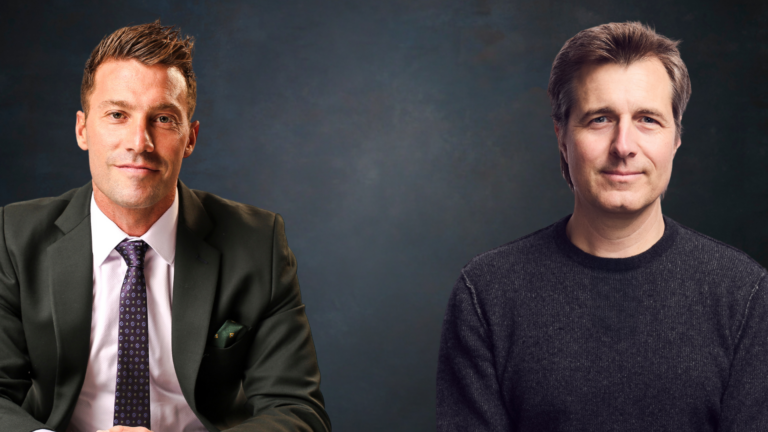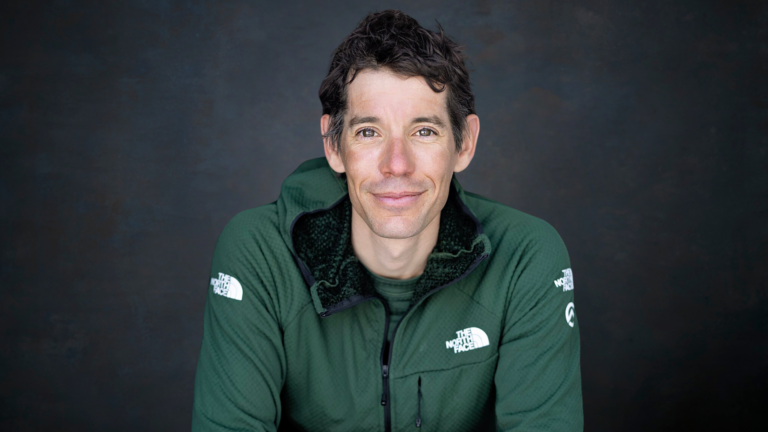Imagine being suspended in the cosmos, gazing down at Earth, experiencing a sense of freedom that transcends gravity’s pull.
It’s an almost impossible task to pinpoint the most interesting thing about this week’s guest… she’s a remarkable human who’s never met a dream she didn’t turn into reality.
Anousheh Ansari is an extraordinary entrepreneur, engineer, and trailblazer who has etched her name in history as the first self-funded woman – as well as the first Iranian and Muslim woman – to journey to the International Space Station.
Anousheh’s life story reads like an adventure novel, starting with her curiosity that led her to explore the skies and ask the questions that would eventually take her beyond our planet. Born in Iran and later immigrating to the United States, her journey was marked by the Iranian Revolution, a war with Iraq, and personal challenges that shaped her unbreakable spirit.
As an engineer, Anousheh is a problem solver at heart. Her passion for tackling challenges led her to
co-found and chair Prodea Systems, while also wearing the hat of CEO at the X Prize Foundation. She embodies the ethos of “action over words,” emphasizing the need to not just identify problems, but to relentlessly pursue solutions towards a better future. She embodies the spirit of an architect of change, inviting us all to be part of shaping a more abundant and equitable world.
From training for over a year to embark on a groundbreaking space mission, to her views on failure and determination, Anousheh’s insights are a treasure trove for those seeking to unlock their potential. Her perspective on entrepreneurship, the power of passion, and the importance of surrounding oneself with a dedicated team forms the blueprint for those who aspire to make a difference.
I can’t wait for you to hear this conversation – as we delve into the mind of a true pioneer, a woman whose journey through space is an allegory for defying limits and shaping the future. From the beauty of curiosity to the weightlessness of freedom, Anousheh inspires us to embrace the unknown and dream beyond the stars.
“Instead of being victims of the future, we want to become architects of the future.”
In This Episode:
Curiosity
I have to say that it all started not with a dream first, it started with curiosity, which is what gets me into trouble all the time – even today. I’m a very curious person, and I love to learn. So as a young girl just staring at the night skies and seeing those little shiny objects up there, I’m like, what are they made of? What’s happening up there? So this curiosity of wanting to understand what’s happening outside of our world and being part of it, being close to it, observing it, experiencing it, is what started the dream of wanting to become an astronaut and actually travel to space and explore space. And it continued to expand. It’s what made me interested to learn physics and math and get involved in STEM and different technologies and made me love sci-fi and watch Star Trek in Iran growing up.
Childhood
Life was normal until I was about 12 and then the revolution happened and the revolution sort of turned my life upside down because all of a sudden I was hearing gunshots and screaming and people being killed and explosions, and I didn’t understand the violence that was happening in the street. And prior to that, I had never experienced violence in that way. And probably it was a year and a half into it that the war with Iraq happened, and then it went from a revolution to a war and sirens and going into shelters and not standing in line for food and fuel and just to keep yourself warm. And so it was sort of my whole life all of a sudden, very rapidly was turned upside down. I was in Iran until I was about 16. So I was there four years into the war and then I had the great opportunity to leave and come to US, and that’s when my life began again.
Looking forward
I never spend a lot of time analyzing my past, to be honest with you. As I said, I don’t know, my nature is moving forward, looking forward, and I rarely look in the back mirror – because unless there was a problem or a mistake I made, because I do want to learn from it and not make that mistake again. So I sometimes overanalyze mistakes, but most of the time I’m looking forward. I think from an early age, and it started maybe because my parents got divorced when I was very young.
Holding a standard
I am hard on myself to make sure that I do my best, but I have a high bar for myself. I’m a perfectionist against my own bar. I don’t care what others think of me. So I don’t want to be perfect in the eyes of others, but I want to be perfect based on my own standards.
The next step
In life, one thing that I’ve learned is I can do better and do more than I believe I can if I take it one step at a time. I never try to think of a thousand steps. I know that roughly that’s where I’m going, so I’d look at the destination, then I put my head down and take one step at a time. And that’s how I know I move forward.
Room for failure
The sweetness, the softness about myself and why I like myself is that I answer my own call when there is a new thing that I want to do. I do a debate with myself, especially now I’m 56 years old, so I’m like, do you really want to push yourself again? Didn’t you have enough? Like no, I need to do this. I can do this. And then I answer my own challenge. And that’s why I’m like, okay, let’s do this, let’s do this, let’s move forward. And I always, especially now, I give myself room for failure. Accepting that failure is part of life was I think where this sweetness comes from. As long as I try something, even if I fail at it, I’m okay with myself. It’s when I don’t try that I’m not okay with myself.
Seeing problems
I see problems that need fixing. I don’t see problems as things to complain about or being overwhelmed by the problem. But there’s this thing, when they ask me to introduce myself, I always first say I’m an engineer, because I feel that’s what I identify more than anything else I’ve done in my life, is this thing about problem solving. And my family members tell me, don’t tell Anousheh anything because as soon as you say a problem, she’s like, okay, let’s do this, let’s do that. I’m ready with solutions. I see a problem, but not all of them are opportunities, but I look at them with a curious mind of trying to solve them.
Her space exploration
People use “space tourist” [to define me] and I don’t like space tourist…Because I feel like as a tourist, you just buy a ticket and take your camera and get on a plane and go. I had to train a whole year. So that’s why I don’t like the word tourist. And I always say it’s like people who climb Mount Everest, do you call them Everest tourist? You don’t. And they have a ton of Sherpa to carry their stuff and all that. So space is not tourism, it is exploration, it’s a adventure trip that you take. I trained for a whole year to go there and it was something I had worked toward and dreamt of doing all my life. So that’s why I don’t like diminishing how important that was.
Finding calm
One thing that I practice more than anything else during this time is breathing and just calming myself down with breathing. Because the thing I was really afraid of was sitting on top of the rocket on the day of the launch because they monitor your heart rate and everything and if they feel like you’re not doing well, they’re going to stop the launch. I’m like, I don’t want to get all the way there. And then because I’m panicking or I’m scared to have the launch scrapped because they’re thinking I’m going to have a heart attack. I didn’t know if I would be scared or not. I had been training to make sure that I can do breathing exercises, slow my heart rate down. So even if I was scared mentally, in my head scared that I could physically not demonstrate signs of fear, so I would actually continue with the mission. But what happened was the total opposite.
What is it like to be in space?
It was incredible. One of the experiences I had that I didn’t anticipate was a sense of freedom that I felt, which was strange. It was a freedom I have never felt in my entire life and not since I came back. I don’t know if it was because I felt free of the force of gravity and I was just floating and I was looking at our planet through this porthole and basically it was an out-of-body experience of everything, all my memories, people I cared about, my life, everything was right there in front of me and I was out here floating free of its force of gravity. And I loved that sense of freedom…It was a freedom, we live our lives, we have people we care about, we have commitments, we have things that we need to do. We have jobs, work, lots of noise, noise of life, and you’re in the middle of it. And I was all of a sudden outside of it, and even though it was temporary, somehow my brain believed that it’s not temporary. So for that moment I’m like, life has stopped. It’s like imagine that someone presses a pause button on your life and the only person who’s animated is you. Nothing else moves, nothing goes in, you don’t have to worry about anything.
Advice for entrepreneurs
Anyone who wants to start a new company or have an idea, the first thing I tell them, I want them to be realistic about what it takes to build a company. Because if you enter something with the wrong expectations, then you’re not going to survive, it’s going to be more difficult and it’s just not going to be what you are hoping it would be. So if you enter this with not through the rosy glass lens of Silicon Valley and what you hear about it, but that it’s going to be hard work, lots of sleepless hour, lots of stress, requires lots of energy and sacrifice, and you’re going to dedicate yourself and life to it for a period of time. If you go into it with that expectation, then the next most important question comes to you is, is it worth it? So are you passionate, truly about what you want to start and build? Because that’s what it takes.
Building a team
Have the right people around you. It doesn’t have to be a large group of people, but people who will share this passion with you, who will be on this journey with you to hold your hand, to help you get up when you’re down and you will be there for them. So this sort of sense of comradery, friendship, trust with small group of people, that will help you through this very difficult and long journey. I think those are some of the most important ingredients.
Expressing your passion (and XPrize)
I always talked about my passion. I believe that if you’re passionate about something, even if it’s a crazy idea, you need to talk about it because you never know who’s going to read or listen to it and be in the room and help you. I always talked about it. So he read this, decided to come meet me and told me about this concept. Then as an entrepreneur, it made sense to me, and this is at the core of XPRIZE, where you have a big problem, in this case was opening up space to commercial activities and access to space. And so you set this target and you tell the world to go solve it, to build a solution for it, and then demonstrate the solution successfully with very measurable objectives. And then once they do, they win the prize.
The Ansari X Prize
Instead of just focusing on space, we now have applied it to seven domains. So space and exploration always is one, but we work in climate and energy, biodiversity, learning and society, health, deep tech, quantum, food, waste, water. And in each of these areas we have targets on how to create an equitable world of abundance in health, in food and nutrition, in energy and sustainable climate. We have these targets and we are launching these series of competitions on a roadmap to get us to that future. So instead of being victims of the future, we want to become architects of the future. We are inviting the world to join us, to participate with us, to be a brain trust or advisor or a visionary who will help us set these targets, find ways, what breakthroughs we need, what behavior changes we need, how can we create awareness about the problems and bring more people to join us in this movement. So everyone, somehow they can participate on this journey as long as they see the world through this hopeful lens that, yes, we can build a better future and we can’t wait for others to do it. We can’t just complain about the problems. We are the place people go to when they want to take action.



